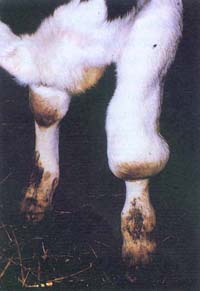The brucellosis is caused by Brucella abortus, B.melitensis, B. suis, B.
ovis and B.canis. The Brucella species are non-motile, non-sporing,
small gram negative rods or coccobacilli. B. abortus is the common
organism that causes disease in cattle and buffalo.Goat, sheep and
cattle infected with B. melitensis poses a public health problem.
Susceptible Hosts
Though all the species of Brucella are relatively specific for individual species of animals but they can produce infection in other species of animals and man. The buffalo, goat, sheep, horse, dog cat etc.
Mode of Transmission
Brucella infection is spread through ingestion of food and water contaminated with discharges of aborted foetus or foetal membranes. Through creaks in the skin. Occasionally through inhalation. Some time, the organism may pierce the intact skin or conjnctiva.
Clinical Symptoms
Brucellosis is the most common cause of abortion in cattle. Abortion usually takes place from 6 month onwards i.e. last trimester of pregnancy. There is grayish white mucoid or muco purulent discharges from the vagina . Prior to parturition cow may show clinical pattern of normal parturition.There is retention of placenta/foetal membrane, necrotic changes in cotyledons. This may lead to chronic endometeritis.
In bulls the genital organs are affected leading to obvious manifestation of epididymitis and orchitis.

Control
Article Credit: http://www.dairyfarmguide.com/brucellosis-contagious-abortion-0222.html
Susceptible Hosts
Though all the species of Brucella are relatively specific for individual species of animals but they can produce infection in other species of animals and man. The buffalo, goat, sheep, horse, dog cat etc.
Mode of Transmission
Brucella infection is spread through ingestion of food and water contaminated with discharges of aborted foetus or foetal membranes. Through creaks in the skin. Occasionally through inhalation. Some time, the organism may pierce the intact skin or conjnctiva.
Clinical Symptoms
Brucellosis is the most common cause of abortion in cattle. Abortion usually takes place from 6 month onwards i.e. last trimester of pregnancy. There is grayish white mucoid or muco purulent discharges from the vagina . Prior to parturition cow may show clinical pattern of normal parturition.There is retention of placenta/foetal membrane, necrotic changes in cotyledons. This may lead to chronic endometeritis.
In bulls the genital organs are affected leading to obvious manifestation of epididymitis and orchitis.

Control
- Vaccination should be done in all female calves.
- Where it is desire to eradicate the disease, test and slaughter method will be the most rational approach.
- All abortion should be suspected to be due to brucellosis, unless otherwise proved.
- Very strict hygienic procedure should be maintained.
- Contaminated premises must be disinfect properly.
- All newly purchased animals should be tested.
- The calving should be attended with all hygienic precaution.
- It is necessary to test the animals those have aborted, 3 weeks following abortion and reactor should be eliminated.
Article Credit: http://www.dairyfarmguide.com/brucellosis-contagious-abortion-0222.html
No comments:
Post a Comment